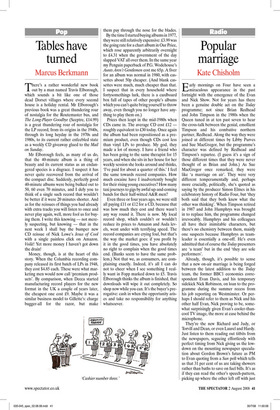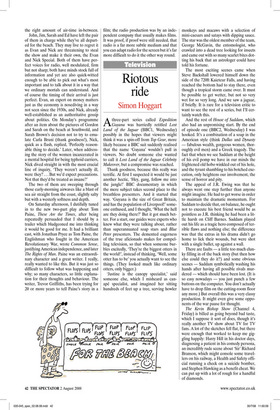Popular marriage
Kate Chisholm
Early mornings on Four have seen a miraculous appearance in the past fortnight with the emergence of the Evan and Nick Show. Not for years has there been a genuine double act on the Today programme; not since Brian Redhead and John Timpson in the 1980s when the Queen tuned in at ten past seven to hear the cross-talk between the genial, emollient Timpson and his combative northern partner, Redhead. Along the way they were joined at different times by Libby Purves and Sue MacGregor, but the programme’s character was defined by Redhead and Timpson’s repartee. (I guess it’s a sign of those different times that they were never thought of as Brian and John.) As Sue MacGregor once remarked, they were like ‘a marriage on air’. They were very different temperamentally and, perhaps more crucially, politically, she’s quoted as saying by the producer Simon Elmes in his celebratory history of Radio Four, but ‘they both said that they both knew what the other was thinking’. When Timpson retired in 1987 and John Humphrys was brought in to replace him, the programme changed irrevocably. Humphrys and his colleagues all have their inimitable characters, but there’s no chemistry between them, mainly one suspects because Humphrys as teamleader is essentially a one-off. He’s even admitted that of course the Today presenters are ‘a team’ but in the end ‘they are sole performers’.
Already, though, it’s possible to sense that a new on-air marriage is being forged between the latest addition to the Today team, the former BBC1 economics correspondent Evan Davis, and his temporary sidekick Nick Robinson, on loan to the programme during the summer recess from his job reporting on Westminster. Or perhaps I should refer to them as Nick and his other half Evan, Nick proving to be, somewhat surprisingly given Evan’s cooler-thancool TV image, the more at ease behind the microphone.
They’re the new Richard and Judy, or Torvill and Dean, or even Laurel and Hardy. Just listen to them reading out titbits from the newspapers, segueing effortlessly with perfect timing from Nick giving us the lowdown on the mounting newspaper speculation about Gordon Brown’s future as PM to Evan quoting from a Sun poll which tells us that 31 per cent of us are taking showers rather than baths to save on fuel bills. It’s as if they can read the other’s speech-pattern, picking up where the other left off with just the right amount of air-time in-between.
John, Jim, Sarah and Ed have left the pair of them in charge while they’ve all departed for the beach. They may live to regret it as Evan and Nick are threatening to steal the show and make it their own, the Evan and Nick Special. Both of them have perfect voices for radio, well modulated, firm but not sharp; both have minds stock full of information and yet are also quick-witted enough to be able to pick out what’s most important and to talk about it in a way that we ordinary mortals can understand. And of course the timing of their arrival is just perfect. Evan, an expert on money matters just as the economy is nosediving in a way not seen since the 1930s, and Nick, already well-established as an authoritative gossip about politics. On Monday’s programme after an item about the pictures of Gordon and Sarah on the beach at Southwold, and Sarah Brown’s decision not to try to emulate Carla Bruni (thank goodness!), Nick, quick as a flash, replied, ‘Perfectly reasonable thing to decide.’ Later, when addressing the story of the women incarcerated in a mental hospital for being typhoid carriers, Nick dived straight in with the most crucial line of inquiry, ‘They weren’t actually ill, were they? ... But we’d expect precautions. Not that they’d be treated as insane?’ The two of them are sweeping through those early-morning airwaves like a blast of sea air straight from the coast, slightly salty but with a westerly softness and depth.
On Saturday afternoon, I dutifully tuned in to the new two-part play about Tom Paine, These Are the Times, after being repeatedly persuaded that I should by a trailer which bludgeoned me into thinking it would be good for me. It had a brilliant cast, with Jonathan Pryce as Tom Paine, the Englishman who fought in the American Revolutionary War, wrote Common Sense, justifying American independence, and later The Rights of Man. Paine was an extraordinary character and a great writer. I really, really wanted to like this. But it was just so difficult to follow what was happening and why; so many characters, so little explanation for their thoughts and behaviour. The writer, Trevor Griffiths, has been trying for 20 or more years to tell Paine’s story in a film; the radio production was by an independent company that usually makes films. It was proof, if proof were still needed, that radio is a far more subtle medium and that you can adapt radio for the screen but it’s far more difficult to do it the other way round.



























































 Previous page
Previous page